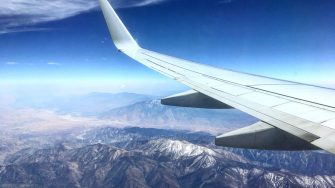
The purpose of the Michael Tallis PhD Research Travel Award is to provide international learning, research and networking opportunities for PhD candidates studying Statistics or Data Science at the UNSW School of Mathematics & Statistics.
The Award will support travel and associated costs to attend an international university and/or international conference in aid of research progress, to promote collaborations and develop the candidate's professional career. It will also assist in promoting the value of Australian research and assist with overcoming the challenge of geographical isolation.
This award is being donated by the Michael and Joan Tallis Endowment as a sub-fund of the Australian Philanthropic Services, set up by their daughter Lindy Tallis and is to honour Michael Tallis' memory, and his interest in statistics such as applied research into medical problems.
-
George Michael Tallis (Mike) was born in Melbourne on 10 August 1931
After private tutoring in his early years, he entered Geelong Grammar School at the age of 12 to complete his schooling. He graduated from Longerenong Agricultural College in 1953 with a Diploma and a BSc in Agriculture, before going to the USA to study Human Genetics at Ohio State University, graduating with an MSc (1956) and PhD (1957). On his return to Australia, he joined Helen Newton Turner's group in the CSIRO Division of Animal Genetics transferring to the CSIRO Division of Mathematical Statistics in 1961.
He undertook further (part-time) study at the University of New South Wales, graduating with an MSc in Mathematics in 1963, and a PhD in Statistics in 1965. In 1964, he took leave to visit the Department of Biostatistics, Johns Hopkins University, returning to CSIRO in 1967.
In 1970, he left his position as Principal Research Scientist to take up a position as Reader and subsequently Associate Professor at the University of Adelaide. After retiring in 1992, he continued as an Honorary Visiting Research Fellow until 2000. In 1976, he was awarded a DSc by the University of New South Wales in recognition of his research in Applied Statistics, Mathematical Statistics and Computer Modelling of Biological Systems, and his ability to identify suitable problems for research.
After 2000, he continued a very active research program, much of it with his wife Joan, with whom he documented the Tallis family history. He authored or co-authored 96 peer-reviewed articles and wrote 5 books, most notably The Silent Showman, which recounted the story of Michael's grandfather Sir George Tallis, the man behind the world's largest entertainment organisation in the 1920s, and of the first 50 years of the Australia's theatre company, J. C. Williamson Ltd.
Michael left behind a collection of 120 published and unpublished papers and 168 mathematics, statistics & genetics books that were donated to the University of Adelaide and the UNSW School of Mathematics & Statistics by his daughter Lindy Tallis.
Michael particularly enjoyed working with extremely gifted statisticians who were working on problems important to Australia and whose research findings have made a valuable contribution. He was an advocate of international exchange opportunities to provide learning, growth, research exchange and networking opportunities.
-
- Up to two applicants may receive the award each year.
- Each award will have a value of $5,000.
-
- The candidate must be enrolled in an accredited PhD course of study in Statistics, or Data Science, in the UNSW School of Mathematics & Statistics.
- The Award is available to full-time, and part-time, candidates with satisfactory progress.
-
The Award shall be awarded competitively, taking into account academic merit, the benefit of the travel program to the candidate’s study, and alignment with the following:
- Preference will be given to students in the second half of their candidature.
- Preference will be given to candidates whose PhDs involve both theory and applications, including working with real data.
- Preference will be given to students in the second half of their candidature.
-
Applications should be submitted to Head of School Executive Assistant, Kaye Sedgers and should include:
- A brief letter addressing the selection criteria and outlining
- Schedule of activities, expected outcomes, and benefits to study.
- Travel budget, including transport, accommodation, meals and incidentals, and conference fees.
- An up to date CV and academic transcript.
- A brief letter addressing the selection criteria and outlining
-
The application deadline is 10am on Wednesday 28 January 2026.
-
The candidate will be required to submit a report outlining the impact the Award has made to them and their research. This will be forwarded to the Donor by the Division of Philanthropy.
The candidate may also be invited to give a talk about their international research program to UNSW staff, students and the Donor. This may take place at an Annual School Postgraduate Conference.
